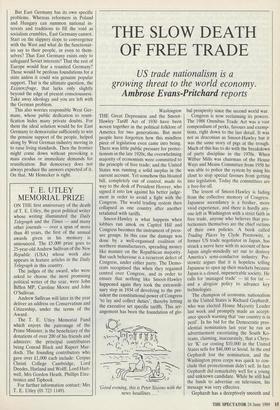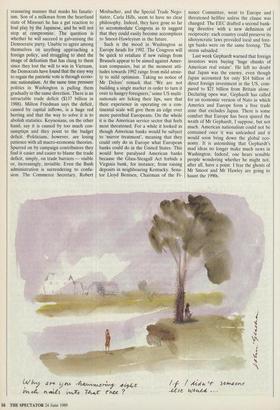THE SLOW DEATH OF FREE TRADE
US trade nationalism is a
Washington THE Great Depression and the Smoot- Hawley Tariff Act of 1930 have been woven together in the political folklore of America for two generations. But most people have forgotten how this mindless piece of legislation even came into being. There was little public pressure for protec- tionism in the late 1920s; the overwhelming majority of economists were committed to the principle of free trade; and the United States was running a solid surplus in the current account. Yet somehow this bloated bill, completely out of control, made its way to the desk of President Hoover, who signed it into law against his better judge- ment in order to avoid a fight with the Congress. The world trading system then collapsed as one country after another retaliated with tariffs.
Smoot-Hawley is what happens when lobbies run amok on Capitol Hill and Congress becomes the instrument of press- ure groups. In this case the damage was done by a well-organised coalition of northern manufacturers, spreading money like manure on the Republican majority. But such behaviour is a recurrent defect of Congress, under either party. The Demo- crats recognised this when they regained control over Congress, and in order to ensure that nothing like Smoot-Hawley happened again they took the extraordi- nary step in 1934 of devolving to the pre- sident the constitutional power of Congress `to lay and collect duties', thereby letting the executive set specific tariffs. This arr- angement has been the foundation of glo- `Good evening, this is Peter Sissons with the news headlines. . . bal prosperity since the second world war.
Congress is now reclaiming its powers. The 1988 Omnibus Trade Act was a vast compendium of perks, favours and exemp- tions, right down to the last detail. It was not as draconian as Smoot-Hawley but it was the same story of pigs at the trough. Much of this has to do with the breakdown of party discipline in the 1970s. When Wilbur Mills was chairman of the House Ways and Means Committee from 1958 he was able to police the system by using his clout to stop special favours from getting into legislation. Today the committees are a free-for-all.
The lesson of Smoot-Hawley is fading from the collective memory of Congress. Japanese ascendancy is a fresher, more vivid experience, and there is hardly any- one left in Washington with a strict faith in free trade, anyone who believes that pro- tectionists themselves are the chief victims of their own policies. A book called Trading Places by Clyde Prestowitz, a former US trade negotiator in Japan, has struck a nerve here with its account of how Japan single-mindedly set out to destroy America's semi-conductor industry. Pre- stowitz argues that it is hopeless telling Japanese to open up their markets because Japan is a closed, impenetrable society. He calls for 'managed trade' — tit for tat and a dirigiste policy to advance key technologies.
The champion of economic nationalism in the United States is Richard Gephardt, who was elected House Majority Leader last week and promptly made an accept- ance speech warning that 'our country is in peril'. In his bid for the Democratic pres- idential nomination last year he ran an advertisement excoriating the South Ko- reans, claiming, inaccurately, that a Chrys- ler 'K' car costing $10,000 in the United States sells for $48,000 in Seoul. In the end Gephardt lost the nomination, and the Washington press corps was quick to con- clude that protectionism didn't sell. In fact Gephardt did remarkably well for a young and unknown candidate. While he still had the funds to advertise on television, his message was very effective.
Gephardt has a deceptively smooth and reassuring manner that masks his fanatic- ism. Son of a milkman from the heartland state of Missouri he has a gut reaction to foul play by the Japanese, and he will not stop at compromise. The question is whether he will succeed in galvanising the Democratic party. Unable to agree among themselves on anything approaching a foreign policy, and struggling to shed the image of defeatism that has clung to them since they lost the will to win in Vietnam, the Democrats have found that the easy way to regain the patriotic vote is through econo- mic nationalism. At the same time pressure politics in Washington is pulling them gradually in the same direction. There is an intractable trade deficit ($137 billion in 1988). Milton Friedman says the deficit, caused by capital inflows, is a huge red herring and that the way to solve it is to abolish statistics. Keynesians, on the other hand, say it is caused by too much con- sumption and they point to the budget deficit. -Politicians, however, are losing patience with all macro-economic theories. Spurred on by campaign contributors they find it easier and easier to blame the trade deficit, simply, on trade barriers — visible or, increasingly, invisible. Even the Bush administration is surrendering to confu- sion. The Commerce Secretary, Robert Mosbacher, and the Special Trade Nego- tiator, Carla Hills, seem to have no clear philosophy. Indeed, they have gone so far to accommodate Congress as to suggest that they could easily become accomplices to Smoot-Hawleyism in the future.
Such is the mood in Washington as Europe heads for 1992. The Congress will be quick to retaliate if new rulings from Brussels appear to be aimed against Amer- ican companies, but at the moment atti- tudes towards 1992 range from mild anxie- ty to mild optimism. Taking no notice of Mr Delors' remark that 'We are not building a single market in order to turn it over to hungry foreigners,' some US multi- nationals are licking their lips, sure that their experience in operating on a con- tinental scale will give them an edge over more parochial Europeans. On the whole it is the American service sector that feels most threatened. For a while it looked as though American banks would be subject to 'mirror treatment', meaning that they could only do in Europe what European banks could do in the United States. This would have paralysed American banks because the Glass-Steagall Act forbids a Virginia bank, for instance, from raising deposits in neighbouring Kentucky. Sena- tor Lloyd Bentsen, Chairman of the Fi- nance Committee, went to Europe and threatened hellfire unless the clause was changed. The EEC drafted a second bank- ing directive with a new definition of reciprocity: each country could preserve its idiosyncratic laws provided local and fore- ign banks were on the same footing. The storm subsided.
Last week Gephardt warned that foreign investors were buying 'huge chunks of American real estate'. He left no doubt that Japan was the enemy, even though Japan accounted for only $14 billion of direct foreign investment in the US, com- pared to $21 billion from Britain alone. Declaring open war, Gephardt has called for an economic version of Nato in which America and Europe form a free trade zone that excludes Japan. There is some comfort that Europe has been spared the wrath of Mr Gephardt, I suppose, but not much. American nationalism could not be contained once it was unleashed and it would soon bring down the global eco- nomy. It is astonishing that Gephardt's mad ideas no longer make much news in Washington. Indeed, one hears sensible people wondering whether he might not, after all, have a point. I fear the ghosts of Mr Smoot and Mr Hawley are going to haunt the 1990s.











































































 Previous page
Previous page